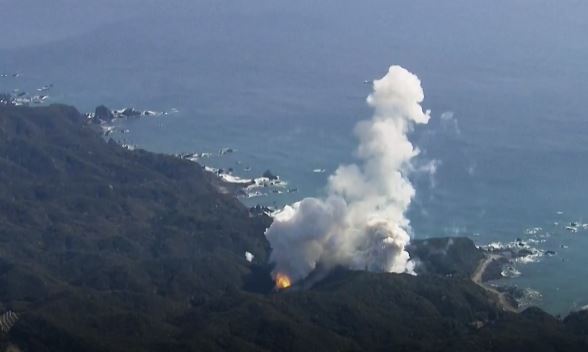Space One, a Japanese start-up, faced a setback in its quest to become the country’s first private company to deploy a satellite into orbit as its inaugural rocket exploded just moments after liftoff on Wednesday. The failure of the Kairos solid-fuel rocket launch dealt a blow to the company’s ambitions and raised questions about the future of its space exploration endeavors.
The ill-fated rocket, measuring 60 feet in length and weighing 23 tons, was launched from Space Port Kii in Wakayama Prefecture on Japan’s main island. The launch took place just after 11 a.m. local time, with livestreams capturing the dramatic explosion that occurred less than ten seconds into the flight. The rocket burst into flames, leaving behind a massive plume of smoke and igniting a fire in a nearby forest that firefighters rushed to contain.
The catastrophic failure of the launch raised immediate concerns about the cause of the explosion and whether any individuals were harmed in the incident. As of Wednesday afternoon, Space One had not issued any official statement regarding the explosion, and inquiries into the matter remained unanswered.
The incident represents a significant setback for Space One, which had been eagerly anticipating the opportunity to showcase its capabilities in the burgeoning private space industry. The company’s goal of placing a satellite into orbit had captured the attention of observers both within Japan and around the world, with hopes high for a successful inaugural launch.
However, the unexpected explosion serves as a stark reminder of the challenges and risks associated with space exploration, particularly for companies venturing into uncharted territory. The precise cause of the explosion remains unknown, underscoring the complexities involved in ensuring the safety and reliability of rocket launches.
Despite the setback, Space One’s journey in the private space sector is far from over. The company is likely to conduct a thorough investigation into the incident, aiming to identify the root cause of the explosion and implement necessary measures to prevent similar failures in the future.
Additionally, the failure of the inaugural launch may prompt Space One to reevaluate its strategies and approach to rocket development and testing. Lessons learned from the incident could lead to refinements in the company’s processes and protocols, strengthening its resilience and readiness for future endeavors.
The explosion also highlights the inherent risks and uncertainties inherent in the aerospace industry, where innovation and progress often come hand in hand with setbacks and challenges. Despite the disappointment of the failed launch, the incident serves as a valuable learning experience for Space One and the broader space exploration community.
As the company navigates the aftermath of the explosion, it will likely face heightened scrutiny and scrutiny from regulators, investors, and industry stakeholders. The incident underscores the need for stringent safety standards and rigorous testing protocols to mitigate the risks associated with rocket launches.
Ultimately, the failure of Space One’s first rocket launch serves as a sobering reminder of the unpredictable nature of space exploration. While setbacks are inevitable, they also present opportunities for growth, resilience, and innovation. As Space One regroups and charts its path forward, the company remains committed to its mission of advancing Japan’s presence in the private space industry and contributing to the global pursuit of space exploration.

